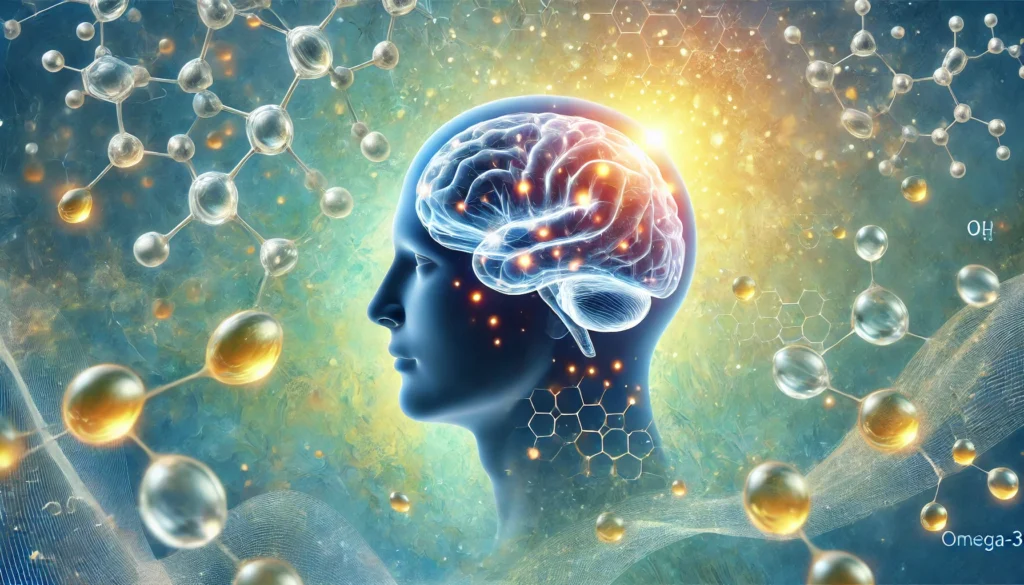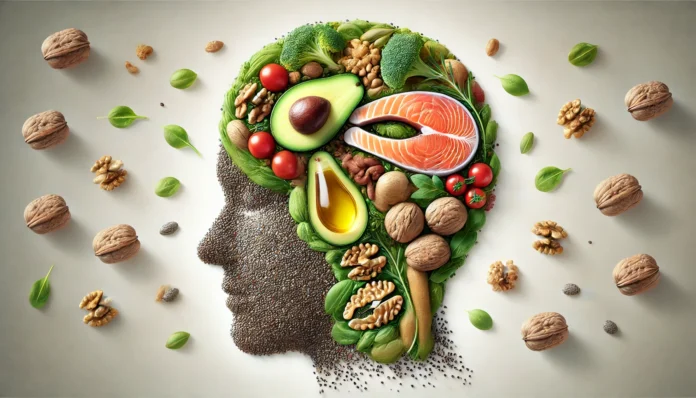The human brain, a marvel of complexity and adaptability, relies heavily on nutrition to function optimally. Among the many nutrients essential to cognitive vitality, healthy fats have emerged as critical components in supporting brain health and promoting longevity. With growing interest in neuroprotection, aging gracefully, and maintaining mental sharpness across the lifespan, understanding how dietary fats influence brain structure and function is not just a matter of curiosity—it is a key strategy for preventive health. As we explore the roles, types, and science behind good fats for brain health, it becomes increasingly clear that fat is not the villain it was once portrayed to be. In fact, the right fats are indispensable for maintaining cognitive resilience, emotional balance, and the neural infrastructure that defines our sense of self.
You may also like: Best Brain Foods for Focus, Memory, and Longevity: What Science Says
Unpacking the Brain’s Lipid Composition: How Much of the Brain Is Fat?
One of the most fascinating—and often underappreciated—facts about the human brain is its lipid-rich composition. Structurally, the brain is approximately 60% fat, making it the most lipid-dense organ in the body. This high concentration of fats is not accidental; it is fundamental to the architecture and function of neurons, synaptic communication, and cellular membranes. So when asking “how much of the brain is fat,” the answer underscores a biological truth: fat is not only present in the brain, it is intrinsic to its very construction.
Phospholipids, cholesterol, and essential fatty acids like docosahexaenoic acid (DHA) make up much of the brain’s fat content. DHA, in particular, plays a pivotal role in the fluidity of cell membranes and the speed of signal transmission between neurons. As a component of gray matter and synaptic vesicles, DHA helps maintain the structural integrity of brain cells while also facilitating efficient neurotransmitter release. Given its prevalence and importance, the question isn’t simply “is the brain made of fat,” but rather, how does this composition affect cognitive function, plasticity, and aging?
The presence of fats in the brain also supports myelination, the process by which nerve fibers are insulated to ensure rapid and accurate signal conduction. Myelin sheaths, which encase axons, are predominantly made of lipids. The maintenance and repair of these sheaths are vital for preventing neurodegeneration and ensuring coherent communication within the nervous system. Therefore, understanding the lipid composition of the brain is foundational to appreciating the broader discussion of healthy fats for brain health.
Essential Fatty Acids and Brain Function: Fat for the Brain Explained
In nutritional neuroscience, essential fatty acids (EFAs) have garnered considerable attention for their role in supporting cognition and emotional health. EFAs—particularly omega-3 and omega-6 fatty acids—are deemed “essential” because the body cannot synthesize them, necessitating their intake through diet. These fats are not just beneficial; they are a biological requirement for building and maintaining the brain’s cellular architecture.
Among these, omega-3 fatty acids, especially DHA and eicosapentaenoic acid (EPA), are widely recognized as crucial forms of fat for the brain. DHA accounts for a significant portion of the brain’s total polyunsaturated fat content and is concentrated in areas responsible for memory, focus, and emotional regulation. A deficiency in DHA can impair cognitive development in children and contribute to cognitive decline in adults. EPA, though less concentrated in brain tissue, plays a critical role in reducing inflammation, a known contributor to neurodegenerative diseases.
Omega-6 fatty acids, while also essential, must be consumed in a balanced ratio with omega-3s to prevent pro-inflammatory states. Linoleic acid, a primary omega-6 fatty acid, supports skin and brain health but can become problematic when consumed in excess. The modern Western diet, often rich in processed seed oils, skews this balance dramatically, underscoring the importance of dietary mindfulness when selecting fats.
Ultimately, incorporating sufficient amounts of essential fatty acids is not just a wellness trend—it is an evidence-based practice rooted in neuroscience. These nutrients serve as the structural foundation for neurons, influence gene expression related to brain plasticity, and modulate neurotransmitter pathways associated with mood and cognition. When we speak of fat for the brain, we are speaking about the literal and functional underpinnings of consciousness and intelligence.

Good Fats for Brain Health: Identifying Optimal Dietary Sources
Knowing which fats benefit the brain is a crucial step toward optimizing cognitive health and aging. Fortunately, nature provides an abundance of good fats for brain health, many of which are readily available in whole foods. These include monounsaturated fats, polyunsaturated fats (particularly omega-3s), and certain saturated fats that, when consumed in moderation, may also offer neuroprotective benefits.
Avocados, for example, are rich in monounsaturated fats, which support healthy blood flow and reduce inflammation—two factors intimately tied to brain health. Olive oil, a cornerstone of the Mediterranean diet, contains oleic acid, a monounsaturated fat linked to improved memory and learning. Fatty fish such as salmon, sardines, and mackerel provide ample amounts of DHA and EPA, offering direct support for synaptic function and emotional stability.
Nuts and seeds, particularly walnuts, chia seeds, and flaxseeds, are excellent sources of alpha-linolenic acid (ALA), a plant-based omega-3 fatty acid that the body can convert—albeit inefficiently—into DHA and EPA. These foods also deliver antioxidant polyphenols and vitamin E, both of which combat oxidative stress in the brain.
Coconut oil, though rich in saturated fats, has been explored for its potential to provide ketones—an alternative fuel source for the brain that may be particularly beneficial in conditions of glucose hypometabolism, such as Alzheimer’s disease. While not a primary fat for the brain, coconut oil may still play a supportive role under specific metabolic circumstances.
By regularly incorporating these good fats for brain health into one’s diet, individuals can support neurogenesis, enhance synaptic plasticity, and reduce the risk of age-related cognitive decline. The emphasis is not merely on adding fat but on choosing the right kinds—those that actively nourish the brain and protect against degeneration.
How Does Healthy Fats Help the Brain? Mechanisms of Cognitive Support
The benefits of healthy fats extend far beyond structural support; they also participate in dynamic biochemical processes that affect how we think, feel, and remember. So, how does healthy fats help the brain in practical, physiological terms? The answer lies in several interrelated mechanisms that span membrane fluidity, neurotransmitter synthesis, inflammation regulation, and mitochondrial function.
At the cellular level, healthy fats contribute to membrane integrity and fluidity, which are essential for receptor function and synaptic signaling. Neurons rely on this fluidity to efficiently transmit electrical impulses and exchange information. DHA’s unique structure, with its multiple double bonds, enhances membrane flexibility, thereby facilitating faster signal transduction and better communication between brain regions.
Furthermore, healthy fats influence the production and release of neurotransmitters, including serotonin, dopamine, and acetylcholine. These chemical messengers regulate mood, motivation, learning, and memory. For instance, insufficient dietary fats can impair serotonin receptor function, potentially contributing to mood disorders such as depression and anxiety.
Inflammation, a known contributor to cognitive aging and neurodegeneration, is also modulated by dietary fat intake. Omega-3 fatty acids, particularly EPA, exert anti-inflammatory effects by reducing the synthesis of pro-inflammatory cytokines and supporting the resolution of neuroinflammation. Chronic inflammation in the brain has been implicated in the pathogenesis of Alzheimer’s disease, Parkinson’s disease, and other forms of cognitive decline.
Additionally, mitochondria—the energy factories of cells—depend on fatty acids for optimal function. Medium-chain triglycerides (MCTs), found in coconut oil, can be rapidly converted into ketones, which provide an efficient energy source for neurons. This is particularly relevant in aging populations where glucose metabolism in the brain may decline, leading to reduced cognitive capacity.
In these ways, the question “how does healthy fats help the brain” encompasses not just the preservation of structural integrity, but the enhancement of mental clarity, mood stability, and long-term cognitive resilience. Healthy fats are active agents in brain chemistry, energy regulation, and cellular repair, making them essential allies in the pursuit of brain health.
The Best Fat for Your Brain: Prioritizing Nutrient-Dense Choices
Identifying the best fat for your brain involves both scientific insight and practical wisdom. While the needs of each individual may vary based on genetics, lifestyle, and metabolic health, certain fats have consistently demonstrated superior neuroprotective qualities in clinical and epidemiological studies.
Among the most celebrated is DHA, found abundantly in fatty fish and fish oil supplements. Its dominance in neural tissue and role in synaptic plasticity make it arguably the best fat for your brain. Regular consumption of DHA-rich foods has been associated with improved memory, decreased risk of dementia, and enhanced emotional regulation. For individuals with limited access to fish, algae-based DHA supplements offer a plant-based alternative that delivers similar benefits.
Extra virgin olive oil, another top contender, stands out not just for its monounsaturated fat content but for its antioxidant polyphenols, which reduce oxidative stress and support vascular health. The Mediterranean diet, rich in olive oil, has been linked to lower incidence of cognitive decline and greater longevity.
Nuts—especially walnuts—have also earned distinction for their brain-supportive properties. Rich in ALA, vitamin E, and polyphenols, walnuts contribute to improved neuronal communication and reduced inflammation. When included as part of a balanced diet, these fats can collectively provide the structural building blocks, anti-inflammatory protection, and energy substrates necessary for optimal brain function.
Ultimately, the best fat for your brain is not a single nutrient but a symphony of lipids that work synergistically to support cognition. It involves making intentional choices—favoring whole food sources over processed fats, maintaining a balanced omega-3 to omega-6 ratio, and ensuring regular intake of neuroprotective oils. In doing so, individuals can harness the full potential of fats to nourish not just their brains, but their entire nervous systems across a lifetime.
Healthy Fats and Cognitive Longevity: Sustaining the Brain Across the Lifespan
Cognitive longevity—the ability to maintain mental clarity, memory, and learning capacity well into older age—is increasingly recognized as an achievable goal with the right lifestyle choices. Among these, nutrition plays a foundational role, and healthy fats stand out as a key dietary pillar. The aging brain is uniquely vulnerable to oxidative stress, inflammation, and diminished neuroplasticity, all of which can be positively influenced by the strategic inclusion of good fats for brain health.
Research has shown that diets rich in omega-3 fatty acids are associated with a reduced risk of Alzheimer’s disease, vascular dementia, and age-related cognitive impairment. These fats help maintain the integrity of the blood-brain barrier, facilitate synaptic communication, and reduce the accumulation of beta-amyloid plaques—a hallmark of Alzheimer’s pathology. Moreover, healthy fats for brain health help preserve the brain’s white matter, which is crucial for information processing speed and connectivity between brain regions.
Cognitive longevity is not solely about preventing decline; it is also about enhancing performance. Older adults who regularly consume the best fat for your brain—whether through fatty fish, olive oil, or nutrient-dense nuts—tend to perform better on memory tests, executive function tasks, and emotional resilience measures. The neurochemical milieu created by healthy fats fosters the release of brain-derived neurotrophic factor (BDNF), a protein that supports the growth of new neurons and the formation of new synaptic connections.
Additionally, the anti-inflammatory properties of these fats help mitigate the chronic low-grade inflammation that often accompanies aging. Inflammatory cytokines can impair hippocampal function and contribute to mood disorders, making their suppression through diet a valuable tool in mental health maintenance. Fat for the brain is not merely a fuel source; it is a long-term investment in cognitive vitality and psychological well-being.

Frequently Asked Questions: Healthy Fats and Brain Health
1.Can healthy fats improve mental focus and productivity during the workday?
Absolutely. Many people underestimate how dietary fats influence short-term cognitive performance, especially in high-demand environments. Medium-chain triglycerides (MCTs), for example, can quickly convert to ketones, providing a rapid energy source that helps sustain attention and alertness during mentally taxing periods. When consumed in the morning, MCT oil or avocado can support mental stamina throughout the workday without causing the crashes associated with high-carbohydrate meals. These fats are more than fuel—they support neurotransmitter efficiency and contribute to better decision-making and memory retention. In this context, understanding fat for the brain becomes essential to achieving sustained mental output across long hours.
2.How does intermittent fasting affect the brain’s relationship with healthy fats?
Intermittent fasting amplifies the body’s reliance on fat metabolism for energy, which can have beneficial effects on brain health. During fasting periods, the liver converts fat into ketones, which serve as an alternative energy source for the brain and may enhance mental clarity and focus. When the fasting window ends, consuming healthy fats for brain health—such as those from olive oil, nuts, or fatty fish—can help replenish essential nutrients and stabilize mood. This dietary strategy not only optimizes fat utilization but may also promote neurogenesis and reduce oxidative stress. The link between fasting and fat for the brain is gaining traction in longevity research circles for good reason.
3.Are there genetic factors that influence how our brains respond to dietary fats?
Yes, genetics play a significant role in how individuals metabolize and benefit from dietary fats. Variations in the APOE gene, particularly the APOE4 allele, can affect lipid transport and are associated with different risks for Alzheimer’s disease. Individuals with this gene variant may need to be more selective about their fat intake, choosing unsaturated fats over saturated ones to reduce inflammation and support vascular health. Personalized nutrition strategies can help identify the best fat for your brain based on genetic predispositions. For those with genetic sensitivities, the emphasis on good fats for brain health becomes even more important for mitigating long-term cognitive risk.
4.Can a deficiency in healthy fats contribute to mental health disorders?
Emerging evidence suggests that inadequate intake of healthy fats may play a role in the development or exacerbation of mood disorders. Essential fatty acids, particularly omega-3s, are critical for neurotransmitter synthesis and receptor sensitivity. Deficiencies can disrupt the balance of dopamine and serotonin, potentially contributing to symptoms of depression or anxiety. Addressing these imbalances through dietary changes can be a powerful, adjunctive approach to mental health management. When considering how does healthy fats help the brain, one key answer lies in their ability to regulate the very chemicals that govern emotional well-being.
5.What are some practical ways to add more good fats to the diet without increasing weight?
Incorporating healthy fats doesn’t necessarily mean consuming excess calories. Replacing empty carbohydrates or processed snacks with small servings of nuts, seeds, or avocado can shift the macronutrient balance toward more nutrient-dense options. Cooking with oils like extra virgin olive oil or adding chia seeds to smoothies provides an easy nutritional upgrade. Focusing on portion control ensures that you gain the cognitive benefits of good fats for brain health without tipping into caloric surplus. Because fat for the brain also regulates satiety hormones, it can help curb overeating and support a balanced metabolism.
6.How do healthy fats impact children’s brain development?
During early life stages, the brain is rapidly developing, and fat intake is essential for supporting that growth. DHA, a long-chain omega-3 fatty acid, is particularly crucial for visual and cognitive development in infants and young children. Breast milk naturally contains high levels of DHA, highlighting its importance during infancy. Introducing fatty fish and DHA-enriched foods in early childhood can lay a strong foundation for future learning and attention span. In pediatric nutrition, the focus on how much of the brain is fat reminds us that healthy fats are not optional but foundational.
7.Are plant-based diets compatible with optimal fat intake for brain health?
Yes, though some strategic planning is needed. While plant-based diets can provide good fats for brain health through sources like flaxseed, chia, walnuts, and hemp, they often rely on alpha-linolenic acid (ALA), which the body must convert into DHA and EPA. This conversion process is inefficient, so individuals on vegan or vegetarian diets may consider algae-based DHA supplements. Properly designed plant-based diets can still offer the best fat for your brain if emphasis is placed on diversity and nutrient completeness. The answer to “is the brain made of fat” gains practical relevance here, underscoring the necessity of thoughtful fat sourcing in plant-based nutrition.
8.How does aging change the way the brain utilizes fats?
With age, the brain becomes less efficient at utilizing glucose for energy, increasing its reliance on fats, especially ketones, as alternative fuel sources. This shift makes the role of dietary fats even more vital in supporting cognitive function in older adults. MCTs, omega-3s, and monounsaturated fats may offer enhanced support for memory and reduce inflammation-related cognitive decline. Aging also brings reduced digestive efficiency, so choosing easily digestible sources of fat for the brain can enhance nutrient absorption. This stage of life reinforces the value of healthy fats for brain health as a proactive strategy against mental deterioration.
9.What are signs that someone might not be getting enough fat for optimal brain performance?
Common signs of insufficient fat intake include persistent brain fog, poor memory recall, mood instability, and even dry or flaky skin. Since fats are involved in hormone production and neurotransmitter regulation, their absence can disrupt mental and physical equilibrium. People following ultra-low-fat diets may experience chronic fatigue, difficulty concentrating, or even increased anxiety. In such cases, reintroducing good fats for brain health in a balanced way can yield noticeable improvements in cognitive clarity and emotional resilience. When asking how does healthy fats help the brain, recognizing these red flags is a crucial first step.
10.What are the future frontiers of research in brain fats and cognitive aging?
The future of fat-based neuroscience is expanding rapidly, with new studies exploring the use of ketogenic therapies, bioengineered fatty acid supplements, and fat-derived nootropics to enhance brain function. Researchers are also investigating how targeted fat intake might influence the gut-brain axis, epigenetic expression, and the aging process itself. Technologies such as lipidomic profiling may soon allow for personalized fat intake recommendations based on an individual’s unique neural needs. These innovations further confirm that healthy fats for brain health are not just a dietary choice but an evolving frontier in neuroprotective medicine. As science continues to probe how much of the brain is fat and what kinds best support its longevity, new dietary paradigms are likely to emerge.

Conclusion: Embracing Good Fats for Brain Health and Lifelong Cognitive Wellness
As we look toward the future of brain health and aging, one message becomes increasingly clear: the fats we choose to consume today will shape the cognitive landscapes we inhabit tomorrow. Understanding the question “how much of the brain is fat” reveals that lipids are not only structural elements but also biochemical agents that influence everything from synaptic efficiency to emotional regulation. When we ask “is the brain made of fat,” the answer is yes—and this reality demands that we nourish it accordingly.
Healthy fats for brain health are not simply optional dietary enhancements; they are foundational to mental sharpness, neurological resilience, and graceful cognitive aging. Whether derived from wild-caught salmon, hand-pressed olive oil, or omega-rich walnuts, the good fats for brain health fuel the very systems that define our capacity to think, feel, and remember. Moreover, they play a vital role in protecting against the neurodegenerative processes that so often accompany advanced age.
The best fat for your brain may vary slightly by individual, but what remains consistent is the need for whole, nutrient-dense sources of essential fatty acids. When integrated into a lifestyle that includes physical activity, stress management, and cognitive engagement, these fats can support not just longevity but a high quality of life. And when considering how does healthy fats help the brain, the answer echoes through decades of research and tradition: they sustain, they protect, and they empower the mind.
By intentionally embracing the right fats—balancing omega-3s and omega-6s, choosing unrefined sources, and avoiding trans fats—we can create the nutritional foundation for a future defined not by decline, but by sustained vitality. In the end, fat for the brain is not about indulgence but about insight—a profound understanding that what nourishes the brain ultimately shapes the essence of who we are.
brain boosting foods, cognitive nutrition, foods that improve memory, anti-inflammatory diet for brain, neurological health, brain-healthy oils, brain plasticity nutrition, mental clarity foods, brain cell regeneration diet, omega-3 rich foods, ketones and brain function, memory enhancement through diet, foods for mental sharpness, brain energy metabolism, neuroprotective diet, fatty acids for memory, cerebral health, brain fog remedies, healthy aging diet, diet and cognitive function
Further Reading:
Impact of Dietary Fats on Brain Functions
Disclaimer
The information contained in this article is provided for general informational purposes only and is not intended to serve as medical, legal, or professional advice. While Health11News strives to present accurate, up-to-date, and reliable content, no warranty or guarantee, expressed or implied, is made regarding the completeness, accuracy, or adequacy of the information provided. Readers are strongly advised to seek the guidance of a qualified healthcare provider or other relevant professionals before acting on any information contained in this article. Health11News, its authors, editors, and contributors expressly disclaim any liability for any damages, losses, or consequences arising directly or indirectly from the use, interpretation, or reliance on any information presented herein. The views and opinions expressed in this article are those of the author(s) and do not necessarily reflect the official policies or positions of Health11News.


